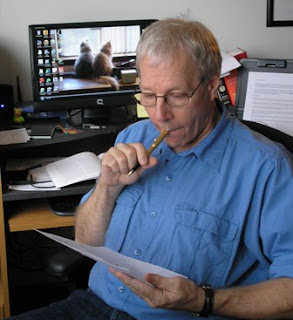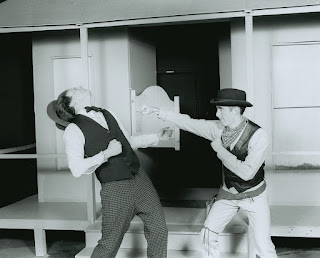With those tales as my model, I wrote my own mystery stories. One chapter took both sides of a wide-ruled tablet page, and they usually ended with the burning car plunging over the cliff or someone getting hit on the head and "everything went black." My mother, who had been a secretary before she married my father, typed the stories, and when I saw my words in print, there was no going back. I knew I wanted to be a writer.
Over the next ten or fifteen years, that idea always lurked in my subconscious even though my parents discouraged it. They were probably afraid I'd starve, and they were probably right. I started college as a pre-dentistry major, hated it, and changed my major to English. In grad school, I took a course on the American short story that unleashed the urge to write again. That fall, I picked up Faulkner's Intruder in the Dust, and the opening set-up--combined with a scandal in my own senior year of high school--gave me an idea for a novel of my own.
By then, I'd taught English for two or three years and was working toward my Master's. I knew how to write a decent sentence and an effective paragraph, so I thought I knew how to write a book. Wrong, wrong, wrong.
Yes, I could write a paragraph, but I couldn't tell a story. Plot and pace were unexplored terrain. Over the next three years, I used summers (around more grad courses) and Christmas vacations to finish that first book. I had no outline and only a vague idea where I was going. At one point, I went back and discovered I had named over 150 characters, most of whom only appeared in one particular scene. I cut most of them. I bought the collection of writers' markets from The Writer and sent my MS out to publishers I knew were waiting with palpitating hearts and bated breath.
I didn't know about a synopsis or a query letter. I simply sent out the whole MS (I did know about the fourth-class postal rate for books) and was disappointed when it came back unread. I put the book away for two or three years, then took a writing workshop at a local college and got some advice. I did a massive revision of the horrible first version and sent it out again, still with no synopsis or query letter. Guess what?
I got another idea and wrote a mystery over the course of the next school year. I think the characters and some parts of the plot were much better than the first book, but I still didn't know how to approach agents or publishers and I still had no outline. It would never sell now because a crucial plot point was a double-exposure photograph. That was a big deal in 1978, but now you can get the same effect in seconds on a computer.
In 1980– eight years after starting to write that first book– I finagled Wesleyan's Graduate Studies center into letting me use the book as my sixth year project if I could find an advisor. Joseph Reed, the Chair of the English department, remembered me from his Faulkner seminar and when I asked if he'd be interested, he said, "Probably not, but why don't you come in and we can discuss it."
For the first time, I wrote an outline, incorporating the changes I wanted to make. I tightened the plot and cut or changed several characters. That outline was simply a list of three or four events that would happen in a chapter, but it was a lean clean roadmap. Reed studied it, then told me to give him a chapter the following week and he'd make his final decision. Then he offered the best advice I'd had so far.
"You have an outline," he said. "So you don't have to write this in order. If you're stuck on chapter five, write chapter ten. You're going to go back and re-write transitions anyway, so it won't be a big deal. And learn to compose at the typewriter. You're too busy to waste time writing everything out longhand and re-typing it."
He was right. I was teaching five high school English classes a day, taking a political novel class with a heavy reading load that met Thursday nights, and working weekends for a photography studio. I had nine months to write the book, revise it, and type two final copies to submit to the grad center.
I did it. Between 1972 and 1980 (I still have a bound copy of that final draft) the book went through at least six title changes. Almost everything except the main premise changed, too. Dr. Reed encouraged me to send the book to publishers, but ten or twelve of them rejected in seconds. I wonder if someone would have read it if I'd sent a proper query letter or synopsis. We'll never know, will we?
The following summer, using my experience composing at the typewriter, I pounded out a 400-page novel in three weeks. It was awful, but I kept it for a few years, telling myself I'd fix it until sanity prevailed and I tossed it. By then, I'd written five unsold novels in about nine years while teaching full-time, earning two graduate degrees, and going through a divorce.
The followng summer, I got persuaded to take part in a play, and loved it. I dove into theater head-first. Between 1982 and 2009, I acted, directed, produced or designed for 100 productions throughout central Connecticut (and took several graduate courses in theater arts, too). I met Barbara, who still acts, too. When our theater lost its performance space in 2003– the same week I retired from teaching--I pulled out that sixth-year novel to fix it one more time.
This time, I attended writing workshops and read books on how to get published. I learned about a synopsis and a query letter. I learned how to write narration (I depended too much on dialogue, probably because I'd done so much theater) and description. My daughter learned of the New England Crime Bake and the Al Blanchard Story Award, so I submitted a short story. It placed in the top ten and the contest co-ordinator encouraged me to re-submit it to the publisher of an anthology of New England writers. It became my first published story, and I attended the conference the next five years, selling a few more stories and meeting agents, editors, and loads of other writers who helped me do it right. I sold my first novel in 2009.
I self-published the sixth-year novel in 2014, and it averages a 4-star rating on Amazon.
I'm an overnight success.


.jpg)




